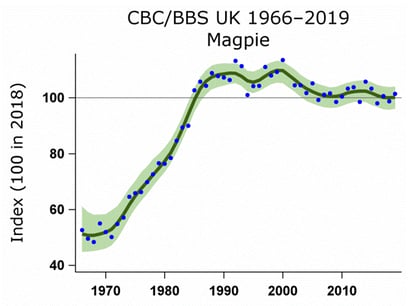Natural England Gamebird Licensing in 2022
In 2021, pheasants and red legged partridges needed a licence for release on or close to some...
about this blogRead moreNatural Resources Wales (NRW) has published its general licences (GLs) for wild bird control for 2024, following the completion of a review of its 2023 GLs. The most significant change is that from 1 January 2024 it will be an offence to kill or take magpie under GL001, which is for the purpose of preventing serious damage or spread of disease to livestock, foodstuffs for livestock, crops, vegetables or fruit. The species which will remain on the 2024 GL001 are Canada goose, carrion crow, feral pigeon, jackdaw and woodpigeon.
Please see full details of the 2024 GLs here. GL001 and GL002 will be in-force from 1 January 2024, GL004 will be in-force from 1 February 2024. With magpie having been previously removed from GL004, from 1 January 2024 it will be an offence to kill or take a magpie in Wales unless one has a specific licence.
Part of NRW’s review of its 2023 GLs was a stakeholder consultation, to which the Countryside Alliance submitted a strong response stating that it did not deem the removal of magpie from GL001 as justifiable in terms of the underlying evidence, reasoning, methodology and probable outcome. The reasoning that NRW gave for the removal of magpie from GL001 is that their conservation concern status has been changed from green to amber, with their population in Wales having decreased by between 25% and 50% in the last 25 years.
The Countryside Alliance recognises this decline in the breeding population of magpies in Wales but believes that there is insufficient evidence that the current control of magpies under GL001 has had a detrimental impact on the population of magpies regarding their conservation status. The population decline statistic must be understood within the context of a decrease in the magpie population across the UK as a whole, which was just 4% between 1995 and 2020. In addition, this small decrease in population has come from an all-time high level. The population has largely been stable since 1990, seeing shallow peaks and troughs. If one were to look back over 50 years, the magpie population more than doubled between 1970 and 1990 before plateauing.

Magpie smoothed population index (with 85% confidence limits in green) for the UK 1966-2019 from the BTO/JNCC/RSPB Breeding Bird Survey BBS and Common Bird Census CBC) (Massimino et al., 2022)
Rachel Evans Director for Wales said:
“We have already seen NRW remove magpie from GL004 which was the licence to control certain species for the purpose of conserving wild birds. The Magpie was removed from this list of species in the last round of consultation. The removal of magpie from the GL001 will inevitably result in damage to both livestock and crops, which will be detrimental to the welfare of livestock and cause economic harm to farmers.
Once again, we are faced with a poor decision made by the quango that is supposed to be an evidence-based organisation. This again deepens the divide between the agricultural sector, the countryside, and Natural Resources Wales.”
Any individual with an ongoing need to control magpie to prevent serious damage to livestock through direct attack and to prevent the spread of disease to livestock or livestock foodstuffs, will need to apply for a specific licence from NRW. For the issuing of specific licences, evidence must be supplied by the applicant of the risk of serious damage posed, NRW state that they will take into consideration that, for magpie, such evidence may not have been gathered and kept. Any magpie bag records will be of use in the specific licence application process. Please see the NRW website for more information on specific licensing and the associated application forms.
![[Shooting]](https://www.countryside-alliance.org/hs-fs/hubfs/Imported_Blog_Media/pheasant-new-Mar-30-2023-09-08-18-7700-PM.jpg?width=365&name=pheasant-new-Mar-30-2023-09-08-18-7700-PM.jpg)
In 2021, pheasants and red legged partridges needed a licence for release on or close to some...
about this blogRead more![[Shooting]](https://www.countryside-alliance.org/hs-fs/hubfs/Animals%20and%20Birds/Red%20legged%20partridge_Shutterstock_May%202023_1400x930px.jpg?width=365&name=Red%20legged%20partridge_Shutterstock_May%202023_1400x930px.jpg)
Updated on Monday 21st August 2023 Defra has updated its Gamebird Licensing Frequently Asked...
about this blogRead more![[Shooting]](https://www.countryside-alliance.org/hs-fs/hubfs/Animals%20and%20Birds/Pheasants%20in%20field_Shutterstock_October%202023_1400x930px.jpg?width=365&name=Pheasants%20in%20field_Shutterstock_October%202023_1400x930px.jpg)
The Countryside Alliance has welcomed the announcement by the Defra Secretary of State that a new...
about this blogRead more